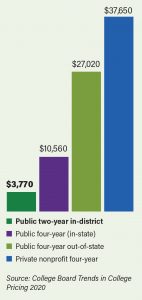
In an era of high college costs, long-term student debt, and an uncertain job market, students and parents consider a college degree as a serious investment. It’s best to weigh criteria like price, debt, post-graduation employability, and pay outlook when deciding on the school’s quality.
How can you make a wise choice? Posing the following questions can help you chart your educational course.
 What are the costs?
What are the costs?
Cost is a — if not the — prime consideration for most students and their families.
In 2020-21, the average published tuition and fees for full-time students were:
- Public two-year in-district: $3,770
- Public four-year (in-state): $10,560
- Public four-year out-of-state: $27,020
- Private nonprofit four-year: $37,650
Source: College Board Trends in College Pricing 2020
What programs are offered?
Community colleges offer various associate degree programs, including some that lead toward a bachelor’s degree or higher through a transfer track and short-term certificates taking a matter of months to complete.
These programs range from industrial and technical, medical and STEM-focused, socially-oriented criminal justice and education degree options to traditional humanities and sciences programs.
What are the economic outcomes for graduates?
Most students are rightly concerned about landing a job after earning a degree. Are the skills you learned in college easily applied in the workforce? Or does a college live up to its claims in terms of providing a better future for its students?
While community colleges are sensitive to local economic shifts and industry needs in their service areas and tailor their courses accordingly, others are less responsive. Community colleges frequently forge partnerships with industry to help their students get cutting-edge skills and get into the career pipeline.
How much debt will I take on?
Because of the low price of community college coupled with financial aid, many students graduate with little to no debt. This is perhaps the “best-kept secret” of community colleges — unfortunately for students who enroll in for-profit schools and wind up saddled with massive debt loads and damaged credit ratings. Starting at a community college can mean avoiding a lifetime of financial headaches.
Will my credits transfer?
Most community colleges have “articulation agreements” with two- and four-year schools and advisors to help you create a successful and streamlined transfer plan.
What resources does the school provide to help me succeed?
Community colleges place a premium on helping students complete their goals, even when life gets complicated by work and family obligations. Most two-year schools offer flexible and online class options that work around your schedule.
Student success outside of the classroom includes financial advising, career placement, tutoring, and other student services vital for navigating higher education.


